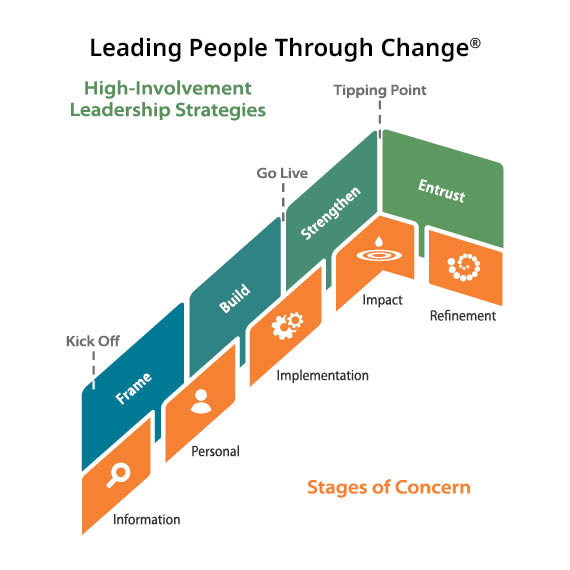Leading People Through Change®
Change the organization in a meaningful way together
There are similar reasons why most change initiatives fail: 80% of companies use a top-down, minimal-involvement approach that ignores the concerns of those affected.
In Lead People Through Change®, change is viewed as an opportunity for high-involvement, collaborative leadership involving all parties. Our 30 years of experience leading organizational change have inspired this inclusive approach.
Recent research shows that dialogue between change leaders and employees can increase change success by 34% to 58%, reduce implementation time by 33%, and increase employee engagement by 38%.


To drive commitment at all levels, open communication is necessary
We know how to get you from where you are to where you need to be during organizational change.
Leaders learn to identify employees’ predictable questions and resolve their concerns to increase employee buy-in and commitment to change initiatives.
In addition to our 30 years of change leadership consulting experience, the course builds upon academic research that finds people are less resistant to change when they can share their concerns and receive appropriate leadership.
Delivery Options to Meet Your Needs
Deliver Leading People Through Change in person, as virtual sessions, as part of a learning journey, or in a self-directed online version, so your leaders can learn how to lead change effectively wherever they are and whenever they have time.
1 Day Instructor-led Course
Leading People Through Change can be delivered as a one-day course. This program teaches your leaders how to identify and address stages of concern that employees go through when asked to change and how to use the appropriate change strategy and corresponding behaviors to address that concern. This high-involvement approach decreases the feeling of being controlled and builds momentum for change.
Prework: LAUNCH — Engaging prework assignments, including an assessment, that explain key concepts
Day 1: FRAME — Activities that introduce the Stages of Concern. Explore Information, Personal, and Implementation Concerns.
Day 1: BUILD — Activities based on personal work challenges that develop new skills and introduce the components of a Gap Statement. Share and discuss the sample Gap Statement.
Day 1: STRENGTHEN — Introduces the third leadership strategy: Strengthen. Discuss outcomes and conduct paired discussions about Strengthen leader actions.
Day 1: ENTRUST — Introduces the fourth leadership strategy: Entrust. Describe and discuss outcomes.
Virtual Instructor-led Course
The Leading People Through Change course can be delivered as four 90- to 120-minute sessions to an intact team working on a specific change initiative, or in an open enrollment format to build change leadership capability across your organization.
- Virtual sessions 1 and 2 teach the skills and language to implement concerns and how to share/discuss the Gap Statement
- In virtual sessions 3 and 4, participants conduct paired discussions about Strengthen Leadership Strategy and outcomes
- Participants receive a set of online tools to aid in sustaining the content and using it with others
The Leading People Through Change curriculum offers a 35-minnute fully asynchronous Overview that allow learners to form new skills. Participants work their way through engaging activities, including videos, interactive exercises, case studies, and quizzes.
Online Overview Solution
The Leading People Through Change Online Overview is a 35-minute course that teaches essential skills like identifying and addressing employees’ predictable questions and resolving their concerns to increase their buy-in and commitment. Practice opportunities follow content, ensuring participants learn the concepts.
- Micro-activities: Organized into bite-sized pieces, ranging from one to five minutes
- Leadership Tendencies Tool: Allows participants to discover their natural strengths and opportunities for growth
- Interactive Exercises: Fun, engaging activities include videos, games, stories, case studies, and online discussions
- Manager-Led Debriefs: Optional manager-led debriefs for collaboration and discussion in a blended learning experience
Digital kbassets
Set of micro-activities, including videos, interactions, and worksheets, that learners can access in moments of need to support ongoing learning, performance support, reinforcement, and custom learning journeys.

To succeed in the future, your organization must understand how to lead through change
Change initiatives that fail or stall waste time and money, lower productivity and engagement, and increase employee turnover.
Learn How To Lead People Through
Organizational Change
Keeping up with the competition involves making change a part of a company’s corporate culture. To move the entire organization forward, leaders who know how to lead organizational change surface, address employees’ concerns, and involve them throughout the process.
Boost buy-in and resilience
The ability to uncover, diagnose, and address people's predictable concerns reduces resistance and increases commitment.
Faster Results
Change initiatives that are led effectively are supported by employees and achieve results more quickly.
Enhance your ability to lead change
Successful companies champion the capacity to change as part of their culture and become more resilient and agile.
Are you ready to get started?
Contact us today to learn how we can help your leaders lead successful organizational change.

